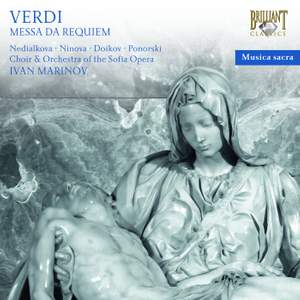‘This performance has a dramatic and dynamic tautness that extends throughout to give a satisfying thought through whole without sounding over-driven. I have paid a lot of money to hear this work over the years, often with ‘name’ conductors and soloists. Not many have given me as much pleasure as this performance.’ Musicweb International review
In 1868 Rossini died, and the leading composers of the day grouped together to contribute to a jointly composed Requiem for the great man who had dominated Italian opera for half a century. Much to Verdi’s frustration, the work was never performed. In 1871, the director of the Milan Conservatoire asked him if he’d ever thought of composing a Requiem of his own – after all, he’d written the Libera me, the final part of the multi-composer work. Verdi dismissed the idea, saying that there were enough Requiems already. In 1873, Verdi’s friend, and favourite author Alessandro Manzoni died aged 88. Verdi had first read his novels when he was 16 years old. He was devastated at his funeral. This provided the catalyst for what is the grandest of all Requiems.
Premiered in 1874 with the composer conducting, it was an immediate success, and Verdi toured the work to Paris, London, Cologne and Vienna – in fact he conducted it more often than any of his operas. Overtly operatic in nature, it has been called ‘Verdi’s greatest opera’, but it is a deeply spiritual work, adhering to the traditional Mass for the dead. It ranks among the very greatest of religious works alongside Bach’s Mass in B minor, Mozart’s Requiem and Beethoven’s Missa solemnis.





